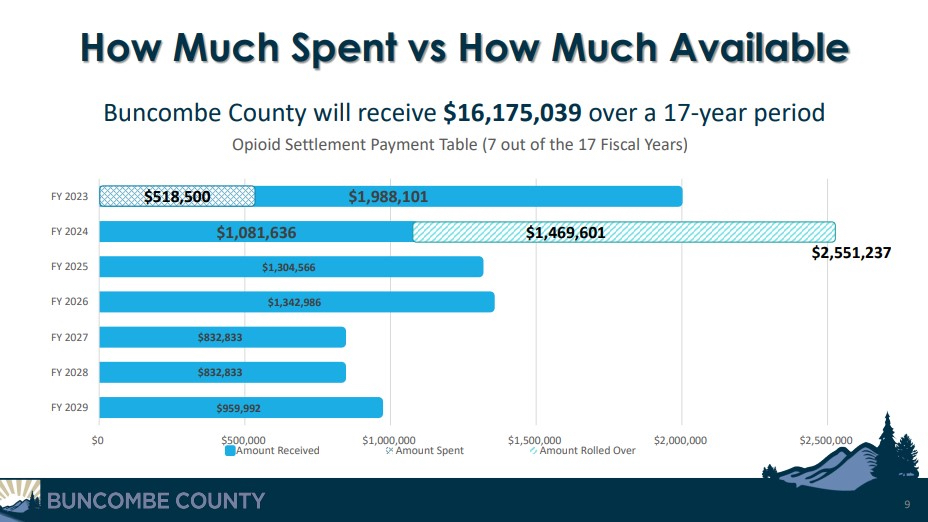Buncombe County leaders continue to develop a long-term response to the opioid crisis — a response newly invigorated by over $16 million promised to the county from a lawsuit settlement with pharmaceutical companies. County behavioral health manager Victoria Reichard updated the county Board of Commissioners about progress toward allocating that money during a Sept. 20 board briefing.
Reichard noted that Buncombe has received about $2 million from the settlement for the current fiscal year, with the remaining money to be doled out over the next 16 years. From those funds, a team of social service providers, law enforcement representatives, county administrators and community members has recommended about $518,000 in immediate spending.
Suggested allocations include $320,000 for the county’s community paramedicine team, about $148,000 for jail and prison community reentry programs and $50,000 for strategic planning. Those projects will be presented for approval by the board at their meeting of Tuesday, Oct. 4. (Representatives from the Mountain Area Health Education Center, the community paramedicine program and the county jail’s medication-assisted treatment program will also share data on the opioid crisis at that meeting.)
Commissioner Jasmine Beach-Ferrara said she was looking forward to fresh information around overdoses and overdose deaths, as well as how expanding programs could help reduce deaths.
“Continuing to expand access to medically assisted treatment is a really high priority as we think about steps and interventions to actually reduce overdose deaths,” she said. She suggested the county look into adding treatment slots as part of its first stage of settlement spending.
Commissioner Brownie Newman asked about using the settlement funds for prevention of addiction, not just treatment. Reichard responded that part of the strategic planning process includes reaching out to organizations that work with young people. She emphasized that getting feedback from young people is crucial to identifying community needs when it comes to prevention.
A steering committee created this month will meet through December as the focus shifts from identifying immediate needs to defining criteria for long-term funding. The committee will create a plan to guide funding recommendations through fiscal year 2025-26, which Reichard said would yield a more cohesive approach than making separate allocations each year.
Board members agreed on the importance of developing a long-term strategy for the funds. Beach-Ferrara asked, “How do we take the step from where we have been — which is having very innovative, very impactful projects that sometimes operate discretely from each other — into having a truly integrated, county-level strategy?”
Reichard said Buncombe’s goal is to create a foundation of programs flexible enough to be used when facing multiple substance abuse problems, “whether it’s opioids, whether it’s methamphetamine, whether it’s something else coming into our community.”
An update on the multiyear financial plan is scheduled come before the commissioners in January or February.
Tropical Storm Fred assistance still available
Also at the board’s regular meeting, representatives from the N.C. Office of State Budget and Management solicited residents whose homes were damaged by Tropical Storm Fred to reach out for assistance. The state’s disaster recovery program, which was created after the storm hit in August 2021, still has funds available to repair homes, roads and bridges damaged last year.
A total of $44 million was allocated last November to aid recovery across 11 counties, including Buncombe, that were impacted by the storm; an additional $5 million was recently added for road and bridge repair after all the money originally intended for that purpose was spent. Only 35% of the money dedicated to home reconstruction and 40% dedicated to home repair has been spent so far.
State project manager Dana Phillips said that while most of the damage caused by Tropical Storm Fred was a result of flooding, eligible home repair is not limited to flood impacts. The funds can also be used to repair damage caused by rain, wind or downed trees — damaged roofs, for example, could be covered.
“There are folks who are probably watching this tonight who know folks who are impacted,” said Phillips. “That’s why we’re here. If you have a problem, let us know. We want to help. We have funding.”
“We’re worried about folks who may be living in unsafe housing,” added Richard Trumper, the state office’s executive director. “We’ve got winter coming. We worry that folks haven’t said they need help. They thought someone else was in a worse position than they were. They didn’t think there would be enough money to help them. Now is the time for those families to reach out and get the help they need.”
Residents can find out more about assistance available for damage caused by Tropical Storm Fred by visiting TSFred.NC.gov, emailing TSFred@NC.gov or calling 828-526-6170.




Per the New York Times, Oregon has spent $300+ million in the last couple years and opiod deaths are up 20%. I’m sure the nanny staters will say it wasn’t enough.
How about the Buncombe staffers lay out the current numbers and then add results over time so we can see the impact, if any?